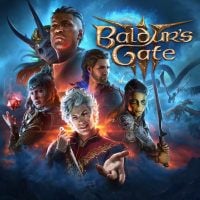Baldurs Gate 3: Abilities
Don't you know what Abilities do in BG3? This guide discusses the properties of each Ability, as well as defensive throws, ability and skill checks.
Last update:
This chapter of the Baldurs Gate 3 game guide describes what character traits you can develop, and how they affect the gameplay and development of your character.
What other role-playing games call "attributes", in Baldurs Gate 3 are referred to as abilities, and these include Strength, Dexterity, Constitution, Intelligence, Wisdom, and Charisma. Each ability includes a wide range of skills in which your character can be proficient. It also helps him or her to use a particular type of weapon or cast spells. Abilities in Baldurs Gate 3 (apart from Constitution) are also associated with certain skills, such as Dexterity with the ability to Sneak, and Charisma with Persuasion.
- All abilities and their features
- Skills and defense rolls
- Abilities and skillchecks
- Abilities and tests
All abilities and their features
The table below lists and describes all of the character abilities available in Baldurs Gate 3 and hint at what skills they are associated with.
 | Strength Strength affects the chance of being hit and injured by a strength-based weapon (e.g. Two-Handed Swords). It also affects the distance your hero can jump and the weight he or she can carry. Strength-related skills:
|
 | Dexterity Dexterity affects the chance of hitting and dealing damage with a weapon based on Dexterity (e.g. bows). It also affects the character's chance to take the Initiative in the fight, which is to execute the first attack, as well as the opponent's chance to hit your character. Skills associated with Dexterity:
|
 | Constitution Constitution determines your hero's overall health, and thus affects the amount of injuries he or she will be able to take before he or she dies. The Constitution ability is not related to any of the skills. |
 | Wisdom Clerics, Rangers, and Druids use Wisdom to cast spells (Spellcasting). It determines the chance of hitting the target with a spell. Skills related to Wisdom:
|
 | Intelligence Wizards use Intelligence to cast spells (Spellcasting). It determines the chance of hitting the target with a spell. Skills related to Intelligence:
|
 | Charisma Warlocks, Bards and Paladins use charisma to cast spells (Spellcasting). It determines the chance of hitting the target with a spell. Charisma skills:
|
Skills and defense rolls
Character abilities can influence the outcome of a defensive dice roll against a threat by adding their modifier to the score thrown on the 1d20 dice. For example, a hero enters an area covered in wild vines and must score at least 12 points to pass through that area unscathed.

In the image above, the hero rolls a success in the Saving Throw against vines and could go on without any difficulty or damage received. It is worth noting here that a Strength 3 modifier was added to the result of the Saving Throw, which gave the hero a total score of 16 points.
Abilities and skillchecks
The abilities can also help the protagonist pass a skillcheck with which they are closely related. With this solution, the hero can earn additional points to the score he or she rolls, thus increasing his or her chances of succeeding.

In the image above, one of the characters can be seen talking to Astarion about an incident on the road. The hero can choose a dialog option related to the skill of Medicine, thus receiving 2 points to the score due to the bonus added from the Wisdom ability.
For more information on all the skills available in Baldurs Gate 3, see the separate page of this guide revolving entirely around skills.
Abilities and tests
During certain dialogues, your character's abilities may make it easier for him or her to perform a particular action. For example, Dexterity may be helpful when performing a delicate procedure to remove the brain from the corpse, and the strength to hit the interlocutor.

The screenshot above shows a situation in which the character is able to use strength during the dialogue and punch one of the interlocutors. The Strength modifier adds 2 points to the hero's score, giving him a much better chance of successfully executing the action.
- Baldurs Gate 3 Guide, Walkthrough
- Baldur's Gate 3: Game guide
- Baldur's Gate 3: Basics
- Baldurs Gate 3: Tips and tricks
- Baldur's Gate 3: All difficulty levels
- Baldurs Gate 3: Lockpicking
- Baldurs Gate 3: Dialogues - conversation system
- Baldurs Gate 3: Combat - turns, action points, mechanics
- Baldurs Gate 3: Stealth - rules of detection
- Baldurs Gate 3: Character creation - class, race, abilities
- Baldurs Gate 3: Abilities
- Baldurs Gate 3: Feats Guide
- Baldurs Gate 3: Skills
- Baldurs Gate 3: Exploration - camp, hidden passages
- Baldurs Gate 3: Merchants guide & map
- Baldurs Gate 3: Bugs, known issues - tips, solutions
- Baldurs Gate 3: How to refund?
- Baldur's Gate 3: Multiclass
- Baldur's Gate 3: Inspiration in BG3
- Baldurs Gate 3: Interface
- Baldurs Gate 3: Multiple romances
- Baldur's Gate 3: Enemy of Justice
- Baldur's Gate 3: All Legendary items
- Baldur's Gate 3: Best Illithid Powers in BG3
- Baldur's Gate 3: Basics
- Baldur's Gate 3: Game guide
You are not permitted to copy any image, text or info from this page. This site is not associated with and/or endorsed by the developers and the publishers. All logos and images are copyrighted by their respective owners.
Copyright © 2000 - 2026 Webedia Polska SA for gamepressure.com, unofficial game guides, walkthroughs, secrets, game tips, maps & strategies for top games.
